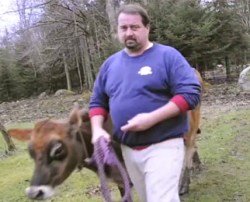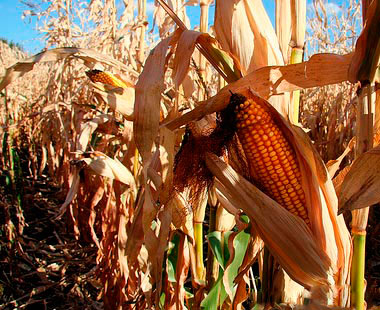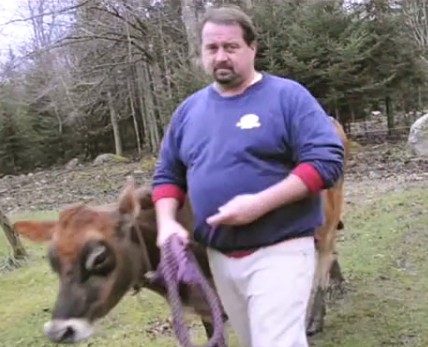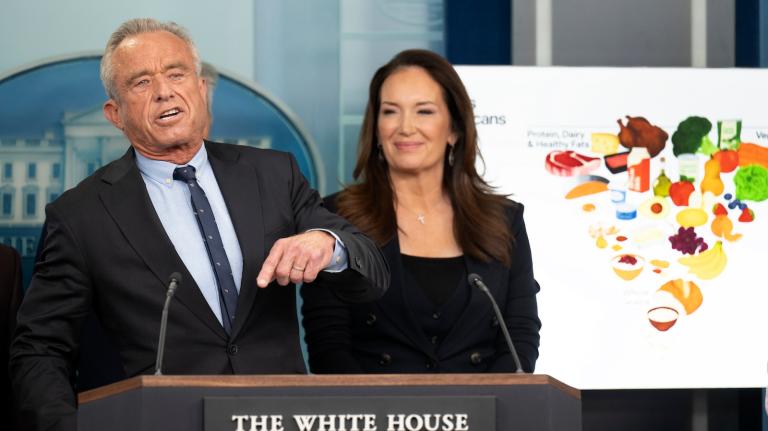
Farmer Dan Brown has been sued by the Maine Dept. of Agriculture for selling raw milk, despite the passage of a food sovereignty ordinance in his town.
New England town meetings typically include dozens and dozens of proposals for citizens to vote up or down, on quickly forgotten matters like new stop lights and bridge repairs.
But this year, things have been different. The residents in eight small Maine towns have all voted to declare “food sovereignty” — and they won’t be forgetting the issue any time soon. In other words, they’ve passed ordinances that explicitly allow local farmers and ranchers to sell their food — meat, eggs, unpasteurized milk, honey, veggies — directly to consumers within town borders, without state or federal licenses, permits, or regulations.
Towns in Massachusetts, Vermont, and California have all replicated these experiments, which in Vermont have all been based on a single template [PDF]. And while the mainstream media is referring to the ordinances as “symbolic,” it is yet to be seen how the courts will rule.
These votes are the result of work by activists in the food sovereignty moment, who see the ordinances as a response to an ever more intensely regulated food system. On the federal level, the recent Food Safety Modernization Act could require small food producers to complete a sophisticated hazard analysis critical control point (HACCP) plan, which would be both costly and tedious. Meanwhile there has also been an increase in local health department enforcement around the country, in places like school bake sales and kids’ lemonade stands.
Activists see food sovereignty ordinances as a compromise of sorts over the thorny issue of private food distribution. And although many food safety measures and regulations were developed alongside industrial food production — and have a place in protecting consumers — many activists now believe they’ve been used to target small businesses. Food sovereignty activists feel that people have a right to acquire food — such as raw dairy products — privately through membership-based food clubs, outside the parameters of long-standing regulations that require retail, dairy, and other permits.
In a recent AP article, Maine’s state agriculture officials said the ordinances “don’t hold legal muster.” But the state’s so-called “local rule” laws could contradict this view. Via its constitution and legislation, Maine confers significant power on municipalities to enact ordinances that are local in nature, and aren’t denied by state law, like controlling town growth or banning herbicide spraying. “Maine has long been considered a strong ‘home rule’ state,” says the Maine Municipal Association. (Here’s a list of these hyper-local laws.)
While everyone who voted to pass Maine’s food sovereignty ordinances knew they were risking conflict with state and federal authorities, they hadn’t imagined the objections would be as swift, or intense, as they have turned out to be.
“Farmers know whether the milk is bad”
Just months after the first six towns passed the ordinances, the state filed a lawsuit [PDF] against a farmer named Dan Brown of Blue Hill, Maine, for selling unpasteurized milk without a state permit. Brown says losing the suit could put him out of business, since complying with state permit requirements would be so costly as to not justify operating his two-cow dairy. He owns the cows primarily so that he can provide milk for his family, and he sells what’s left. (Activists set up a Facebook page in support of Brown called We Are All Farmer Brown.)
“I have never had any questions from customers saying there was any problem with my milk,” Brown told the Bangor Daily News. “This has been done this way for hundreds of years. Farmers, when they milk a cow, know whether the milk is bad or not.”
Brown says the state has devoted significant investigative resources to making the case against him, and he has led several demonstrations, including one at the capital in Augusta, demanding that the state drop the suit.
While there’s no mention of the food sovereignty ordinances in the suit, and state officials have denied a connection, Brown’s defense lawyers obtained email correspondence that suggest otherwise. For instance, a Maine Dept. of Agriculture program manager sent an email in June 2011 — two months after Blue Hill’s food sovereignty ordinance was enacted — about Brown allegedly selling food at a local farmer’s market without a license. “Sounds like we have our first test case,” he wrote.
The email was one of nearly 700 pages of emails, memos, and other documents obtained by the lawyers under Maine’s Freedom of Access Act, and they provide a window into the intensity of the food sovereignty battle. Activists also found written warnings to a second farmer, Heather Retberg of Quill’s End Farm, who has been active in organizing the residents of several towns in favor of the food sovereignty ordinances. One warning reads: “If you refuse to bring your business into compliance and continue to operate in violation of the laws of the State of Maine we will refer this matter to the Attorney General for enforcement action.”
Regulation or retaliation?
The controversy has extended to the top levels of Maine’s government, including Republican Gov. Paul LePage. Last September, after hearing feedback from constituents in support of the food sovereignty ordinances, LePage wrote a memo [PDF] to the head of the Maine Dept. of Agriculture, Walt Whitcomb, that read:
I am particularly concerned about over-regulating the small farms with large capital investments and costly licensing. In recent weeks I have received letters, emails and constituent visits concerning regulations involving intrastate commerce.
Attached to LePage’s memo was a proposed bill in the Maine legislature that would have allowed the sale of raw milk without a state permit. On the proposed legislation was a note that appears to be from the governor or an aide: “This statute sounds reasonable. Please advise the problem you see with it?”
Also attached was a letter from a Maine farmer, John O’Donnell, who wanted to let the governor know what was behind the food sovereignty movement. In the letter, O’Donnell wrote:
As you may know, several Maine towns passed food sovereignty resolutions last year. This was mainly driven by small farmers experiencing unfair regulations that are barriers to entry, and restraint of trade. Many of these farmers fought for the same Maine bills I did, and saw how the Subcommittee on Agriculture was mainly under the control of the large farm and dairy interests and would never let small farm bills out of committee favorably. We also saw how the Department of Agriculture testified in these hearings that there would be repercussions from the USDA or FDA if we relaxed the standards for selling poultry, milk, and other products in our local communities and state.
Under this paragraph was a hand-written note, presumably also from the governor or an aide. It read: “Why would this concern us, if the products are sold intrastate.”
There is no direct response from the Maine Dept. of Agriculture in all the documents. But the department made its opinions known this February in a form letter from Agriculture Commissioner Whitcomb. The letter was addressed to everyone who “shared … thoughts with the administration regarding local food sovereignty ordinances.” Here’s an excerpt:
Local food sovereignty ordinances leave the false impression that residence in certain towns exempt individuals from food licensure and inspection requirements. … Persons who fail to comply (with state laws) will be subject to the Department’s statutory responsibility to enforce state law, including the removal from sale of products from unlicensed sources and/or the imposition of fines.
The cache of emails show the Dept. of Agriculture having reversed a long-standing agency policy of ignoring unlicensed sellers of raw milk who don’t advertise. It also shows the department deciding to intensively investigate any illnesses reported from people who consumed raw milk, even if the illness were known to be highly unlikely to have originated from raw milk consumption.
As early as the summer of 2010 — just when food sovereignty organizers like Retberg were beginning to discuss their plans to push for local ordinances — agriculture investigators began visiting any farm that sold milk to people who contracted a nasty parasite known as cryptosporidium, or “crypto.” According the U.S. Centers for Disease Control, crypto spreads most often from “drinking water and recreational water” and “is one of the most frequent causes of water-borne disease among humans in the United States.”
Depositions are now being taken and arguments made in the state’s case against Brown and the trial could begin next fall. The state of Maine is hoping to end quickly and absolutely any notions people might have that they can distribute food privately, outside regulatory constraints.
While food sovereignty may stem from local efforts, however, it has arisen in response to a much larger problem — one that’s far from localized.
As Bob St. Peter, farmer and food sovereignty, organizer said to WABI, a local Maine TV news channel, recently, “Seventy-six million people a year get sick from foodborne illness. These are systemic problems … When people come to my farm or they come to Dan Brown’s farm they’re looking for a way out. They’re looking for an alternative to that system.”




